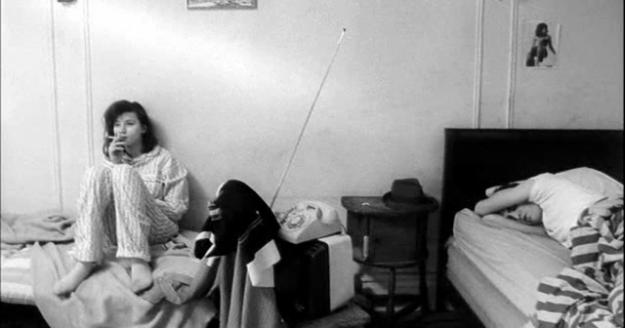
“Boredom is the conviction that you can’t change … the shriek of unused capacities.”
– Saul Bellow, The Adventures of Augie March
In 1964, Bellow wrote Herzog, in which an elderly Jewish man has a very American disintegration and begins to write letters to historical figures and his own guilty subconscious. Later, in 1977, Herzog (Werner, that is) directed the singularly distinctive Stroszek, in which a mentally deficient German accordionist attempts to start a new life in America, only to discover that the nation is a vast cultural purgatory, an endlessly dancing chicken or relentlessly revolving ski-lift.
The idea of these comparisons, I suppose, is to show that America has become a land of clinical desperations. It’s difficult to imagine a film like Stroszek being made in, say, Burma, where life seems almost perpetually beautiful and interesting. And Stranger Than Paradise is another declaration of hopelessness in the face of monolithic cultural emblems. As such, it is a chronicle of boredom and meaninglessness.
Jarmusch seems to want to tell us that there is something profoundly wrong with American masculinity. Willie and Eddie live in rising tides of emptiness, hoping for tomorrow, and yet finding that everyday, and every place, is the same. Their silence isn’t the stillness between bouts of unrealistic articulations; it is the true inability to say anything meaningful. They don’t, unlike Bellow’s Herzog, have anything important or truthful to add to the hubbub of American voices. Willie and Eddie watch TV, play at cards, drive and lose money. It’s unlikely that they have ever done anything else, or even considered that there is anything else to do. And they know that their lives are filled with nothingness. They try to disguise it in many ways; Willie with anger and nonchalance, Eddie with servitude to his friend. ‘Why do I do everything you say?’ he asks, in a rare moment of clarity. But there is no answer, and you feel that things will not change.
But this is Eva’s film. She comes to a grey-palette America, from one kind of purgatory to another, and finds that things are desperately boring everywhere. Yet, even in monochrome, clad in black and barely speaking, she is the flicker of hopefulness at the centre of the film. Those she meets are used-up, spent things, trapped in useless rhythms. America is the street-corner and the hot-dog stall. But she knows that somewhere, out there, exists something to hold on to.
This is comedy. We are forced to laugh and giggle at perfectly hopeless characters. And there is warmth in the transcendence of cultures, where old-world Europeans can find common humanity with Americans in the snap of playing cards, where our differences are gulfed by our similarities. The saddest and most distressing idea, however, is that this great uniting force is boredom itself.
“Routine, repetition, tedium, monotony, ephemeracy, inconsequence, abstraction, disorder, boredom, angst, ennui — these are the true hero’s enemies, and make no mistake, they are fearsome indeed. For they are real.”
– David Foster Wallace
